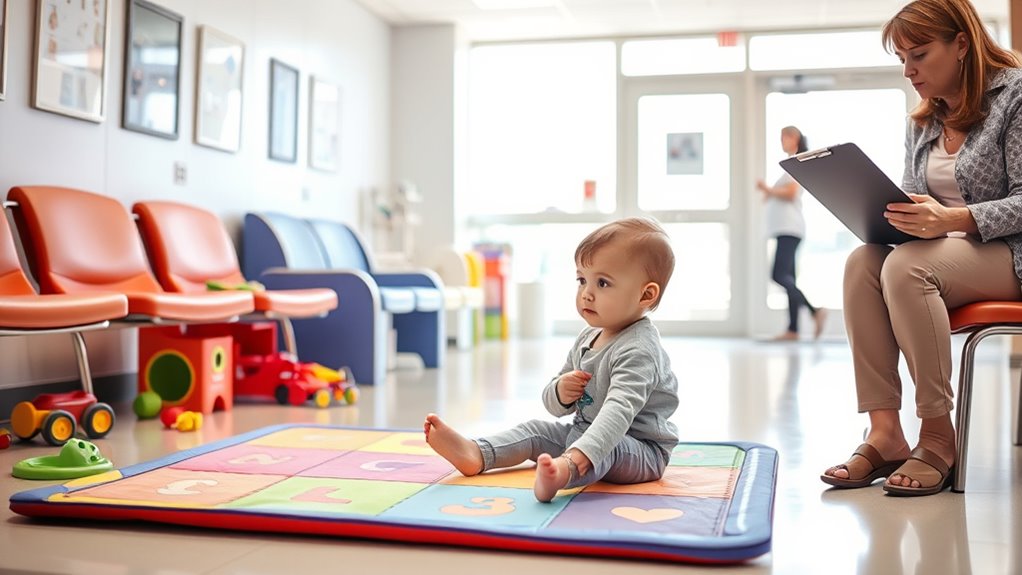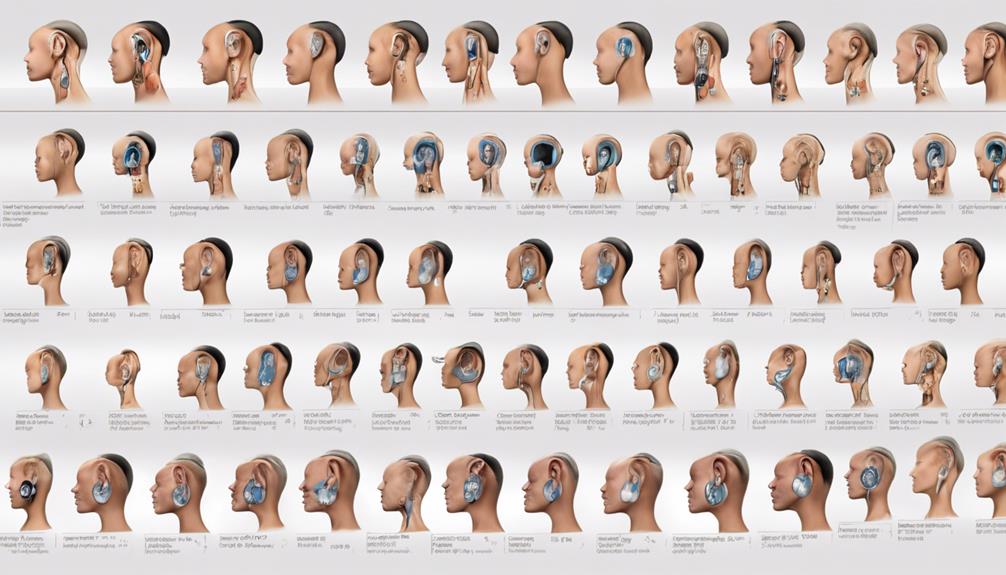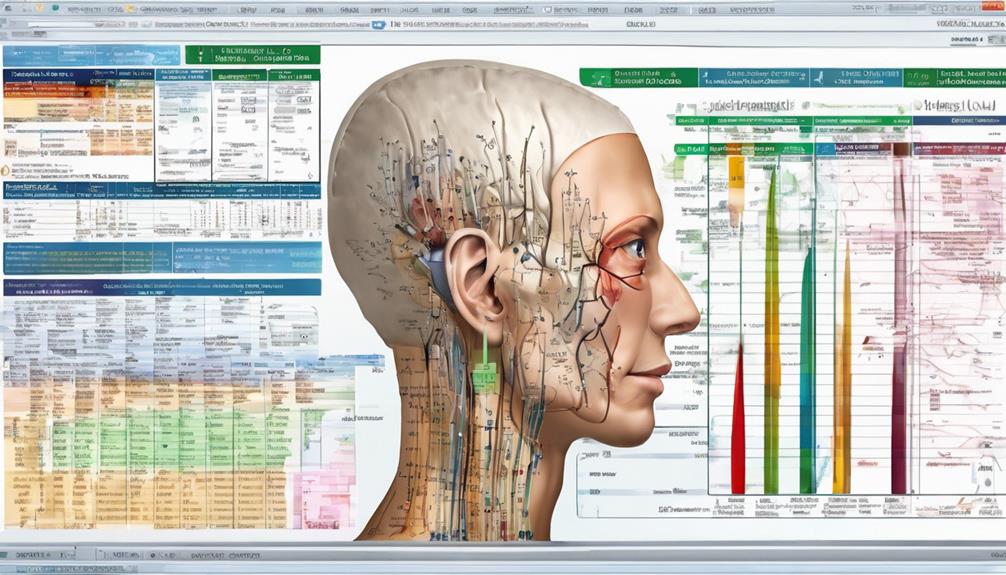Red flags in your child’s hearing development include not responding to loud noises, lacking babbling by 12 months, and not turning toward sounds by 6 months. If your child shows delayed speech or doesn’t engage in conversations, these could also signal hearing concerns. Pay attention if they seem inattentive or unresponsive during interactions. Recognizing these signs early can lead to helpful interventions—keep going to discover more about supporting your child’s hearing health.
Key Takeaways
- Children who don’t respond to loud noises or voices may have hearing or auditory processing issues.
- Lack of babbling or vocal experimentation by 12 months can indicate hearing delays.
- Not turning toward sounds by 6 months is a red flag for possible hearing impairment.
- Delayed speech development beyond typical age milestones suggests potential hearing or communication concerns.
- Inattentiveness or poor responses during conversations may signal hearing difficulties requiring assessment.
Lack of Response to Loud Noises

Have you noticed that your child doesn’t react when they hear loud noises? This could be a sign of an auditory processing issue or a hearing concern. Children typically respond to sudden sounds by turning their head or showing surprise. If your child remains unresponsive, it’s important to contemplate a hearing screening to evaluate their hearing ability. A delay in response might indicate they aren’t processing auditory information properly. Early detection helps identify issues before they affect language development. Auditory processing involves how the brain interprets sounds, so even if hearing sensitivity is normal, processing difficulties can still exist. If concerns arise, consult a professional to ensure your child’s hearing development stays on track.
Limited or No Babbling by 12 Months

If your baby isn’t babbling or making similar sounds by 12 months, it could signal a developmental concern. Early screening is vital to identify potential hearing or speech delays early on. Pay attention to your child’s vocalizations; a lack of babbling might indicate they are not hearing sounds properly or aren’t developing typical speech milestones. Parental awareness is essential—notice if your baby isn’t experimenting with sounds or engaging vocally with you. Addressing this red flag promptly allows for timely intervention, which can markedly improve outcomes. Remember, every child develops at their own pace, but limited or no babbling by this age warrants a discussion with your pediatrician or audiologist to rule out underlying issues. Early action can make a meaningful difference in your child’s communication development. Additionally, hearing assessment can help determine if hearing impairment is contributing to the delay.
Not Turning Toward Sounds by 6 Months

Not turning toward sounds by 6 months can be an important red flag in your baby’s hearing development. If your baby doesn’t react to familiar sounds or voices, it may indicate a hearing issue. Early auditory screening is essential to identify potential problems, especially if your baby isn’t responding as expected. Hearing assessments performed by specialists can determine whether your child’s hearing is within normal limits or if intervention is needed. Keep in mind that some babies develop at different rates, but a lack of response to sounds beyond this age warrants attention. Addressing hearing concerns early can considerably impact your child’s communication skills and overall development. Additionally, advances in auditory screening technology have improved early detection of hearing impairments. If you’re concerned, consult a healthcare professional for a thorough hearing evaluation.
Delayed Speech and Language Development

Delayed speech and language development can signal underlying hearing issues or other developmental concerns. If your child isn’t saying words by age 12 to 18 months or isn’t combining words by age two, it’s important to consider hearing health. Early intervention is essential; addressing these delays promptly can greatly improve outcomes. Speech therapy can help your child develop communication skills and build confidence. If left unaddressed, delayed speech might affect social interactions, academic success, and emotional well-being. Pay attention to whether your child responds to their name, follows simple directions, or uses gestures. Consulting a healthcare professional for an evaluation can identify potential hearing issues early, enabling you to start targeted interventions like speech therapy sooner rather than later. Recognizing hearing health as a crucial factor can guide timely actions to support your child’s development.
Inattentiveness or Poor Response to Conversations

Children who consistently show inattentiveness or struggle to respond during conversations may be experiencing hearing difficulties. If your child isn’t reacting to sounds or isn’t engaging as expected, early screening is essential. This helps identify hearing issues that could be affecting their communication skills. As a parent, increasing your awareness of these signs allows you to seek timely evaluation and intervention. Poor response to conversations isn’t just about behavior; it might indicate underlying hearing problems that need attention. Using specialized planters can help create an environment that supports your child’s auditory and developmental needs. Don’t wait for delays to become obvious—trust your instincts and consult a healthcare professional if your child shows signs of inattentiveness. Early detection through screening can make a significant difference in supporting your child’s hearing development and overall communication abilities.
Frequently Asked Questions
How Early Can Hearing Issues Be Reliably Diagnosed in Infants?
You can usually diagnose hearing issues reliably in infants by around 1 to 3 months old, thanks to screening protocols like OAE and ABR tests. Early detection is vital for early intervention, which supports better language and social development. Regular screenings during well-baby visits help catch issues early, so you can start intervention promptly, giving your child the best chance for healthy communication skills.
Are Hearing Delays Always Permanent or Can They Improve Over Time?
Hearing delays aren’t always a one-way street; they can be like a roller coaster, with ups and downs. Sometimes, hearing regression occurs, but don’t lose hope—many children experience developmental catch-up with early intervention. While some delays persist, others improve over time with therapy and support. Your child’s hearing health can evolve, so stay vigilant, seek professional help, and remember that progress is possible.
What Are Common Causes of Hearing Loss in Young Children?
You might wonder what causes hearing loss in young children. Common causes include genetic factors, which can pass hereditary hearing issues, and environmental influences like exposure to loud noises, infections, or ototoxic medications. Childhood illnesses such as meningitis also contribute. Recognizing these factors early helps guarantee timely diagnosis and intervention, supporting your child’s speech and language development. Regular screenings are essential to catch hearing issues before they impact learning and communication.
How Can Parents Support a Child With Hearing Development Delays?
Imagine you’re in a time machine, and now you’re focused on supporting your child’s hearing development delays. Your parental engagement is crucial—spend quality time talking, singing, and listening together. Use clear communication strategies, like face-to-face interaction and visual cues, to enhance understanding. Be patient and encouraging, celebrating small progress. Your consistent support helps your child develop essential listening skills and builds confidence in their communication abilities.
When Should a Child Be Referred for a Comprehensive Hearing Evaluation?
You should refer your child for a thorough hearing assessment if screening tests indicate hearing loss or if you have any parent concerns about their hearing or speech development. Trust your instincts and discuss any worries with your child’s healthcare provider. Early referral guarantees timely intervention, which is vital for your child’s language and social skills. Don’t wait if you notice signs or if screening results suggest a problem.
Conclusion
Think of your child’s hearing development as a delicate garden. When you notice signs like no response to loud noises or delayed babbling, it’s like weeds sprouting where they shouldn’t. Ignoring these signals risks choking the healthy growth of communication. Catching these red flags early helps you nurture a thriving, vibrant garden of language and connection. Stay attentive, and act promptly—your child’s future conversations depend on it.










